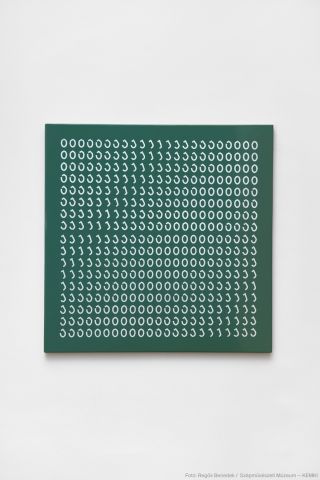‘museum history’
GRÓF Ferenc: Somewhere between 0 and 1 (Hungarian National Painting Grey), 2016–2023
… two numbers. The work is directly connected to the face of the sundial presented at the Kiscell Museum’s exhibition entitled Without Index (2016),[1] alluding to the state of uncertainty that characterises the city described in Tibor Déry’ s novel Mr. A.G. in X (1964), which served as a reference point of the exhibition. In this fictional city, all exists in a state of constant oscillation between the nothingness of Zero and the certainty of One, creating a grey area that forever …
The Design Center Archives
… of Industrial Design (better known as the Design Center), became part of the collection of the Museum of Fine Arts – Central European Research Institute for Art History (ADK). The organisation was established in 1975 within the framework of the Chamber of Commerce, which—alongside the Industrial Design Council Office—carried out representative and influential work in the field of Hungarian industrial design until the late 1980s. The Design Council dealt with the theoretical …
Zsuzsa G. Fábri's Artist Portrait Collection
… comprised part of Zsuzsa G. Fábri’s estate, was donated to the Photographic Collection of the Museum of Fine Arts – Central European Research Institute for Art History (ADK) at the beginning of 2024. This outstanding collection of negatives and vintage enlargements is richly supplemented with additional information. The material also includes numerous never-before-seen photographs of well-known Hungarian artists (Miklós Borsos, Amerigo Tot, Károly Gink, Károly Koffán, János Kass, Endre …
Archives of the Lectorate of Fine and Applied Arts
… diverse and irreplaceable documents, which is accessible in its entirety in the collection of the Museum of Fine Arts – Central European Research Institute for Art History (ADK). The main portion of the Lectorate’s Archives consists of documentation of public works of art (together with the associated photographic material). The rest of the material is comprised of other documents, including a larger collection of official papers—which were transferred to the Lectorate in 1976—related to the …
From the Archives of the Lectorate of Fine and Applied Arts: Minutes of Exhibition Authorisation Meetings
… material of the Lectorate of Fine and Applied Arts—which comprises part of the collection of the Museum of Fine Arts–Central European Research Institute for Art History (ADK)—contains the minutes of meetings that were held from the 1960s to the 1980s for the purpose of evaluating exhibition proposals awaiting official authorisation. From 1963 onwards, the Lectorate had a primarily censorial role in the system of authorising exhibitions and the works showcased at those exhibitions. When it …




